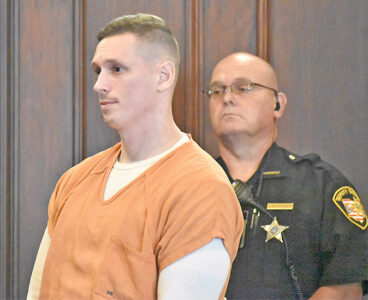Youngstown schools chief, on way out, urges patience

Joseph Meranto
YOUNGSTOWN — Outgoing Youngstown schools Superintendent Joseph Meranto is optimistic the current board of education and CEO Justin Jennings can work together and remove the district from control of a state academic distress commission.
Meranto, however, warned the district needs stability in its leadership to accomplish that goal.
“It can’t keep changing every couple years,” he said. “True change takes at least five years.”
Meranto, 71, who has been working in education for 50 years, on May 12 announced his plan to retire at the end of this school year.
Meranto said the best way to help teachers improve is to speak with and support those on the front lines — teachers, principals and building staff — who are working day to day with children.
HIS CALLING
“I knew when I was 9 years old I wanted to be a teacher,” Meranto said. “It has been my calling. I learned from my dad that people should do whatever they can to help people. It is what I saw him doing all of his life.”
The Youngstown native grew up attending local Catholic schools — St. Anthony and Ursuline High School, and received all of his higher education at Youngstown State University. Meranto’s first
teaching job was at St. Anthony. He remained within Catholic schools for the next 32 years.
“I was the first male teacher at St. Anthony and, later, I was the first lay principal,” he recalled.
Teaching in these religious schools was a tremendous influence on Meranto’s viewpoint toward education. He still has his first contract with St. Anthony, where he earned $5,300 a year.
“We did not make a lot of money,” Meranto said. “It was the relationships I had with students, their families and my fellow teachers that were important.”
Parochial schools are very different than public schools, he explained: principals are like superintendents; they do everything. Only five people worked at the Youngstown diocese central offices.
‘SOMETHING DIFFERENT’
A good friend asked Meranto to apply for a position in the Youngstown school district in 2003, when a career center position opened.
“I was not looking for a job, but I felt it was time to begin doing something different,” he said. “I wanted to go somewhere I could have the biggest influence on students. I felt I could have a bigger impact on Youngstown school students than than those in the Catholic schools.”
Ben McGee was Youngstown schools superintendent when Meranto was hired to be principal of Choffin Career Center’s high school. Within a couple of months, Meranto was put in charge of both the career center’s high school and adult program.
McGee is a member of the state academic distress commission in Youngstown.
One of Meranto’s first decisions was to change the overall philosophy of the career center, from a place where students with grade point averages below 1.7 went to a place where students wanted to be because of the variety of programs.
“I’m a strong advocate of technical schools,” he said. “If I had my way, every student would attend a career tech program.”
‘PEACEMAKER’
The district’s first CEO Krish Mohip approached Meranto about becoming the district’s superintendent in 2017.
Being a superintendent under the academic distress commission’s CEO model is different than being a superintendent without the commission’s oversight.
“Normally, it is the superintendent, working with the elected school board, that develops district policies and implements them,” Meranto said. “My job under (former CEO) Mohip and now (Justin) Jennings has been to be a buffer and bridge between the CEO and the school board.”
In practice, it became increasingly difficult to serve as the bridge as Mohip began to communicate less frequently with the elected board of education’s members.
“I tried to be the peacemaker,” Meranto said.
He made it a point to try to understand the points of view of the school board members and the views of the CEO.
“Although they do not have power under House Bill 70 (which established the commission), school board members are still the elected voice of the people,” Meranto said.
When it became increasingly clear that Mohip would not be returning to the district, Meranto asked to be involved in the search for the next CEO.
When Jennings was waiting to be interviewed for that job, he was sitting outside of Meranto’s office.
“I told him if he gets the position that I would not tell him about anyone, unless asked directly,” Meranto said. “You should judge people for yourself.”
‘GREAT ASSET’
Jennings described Meranto as being a great asset to not only the district but also to education in the Mahoning Valley.
“We had many conversations,” Jennings said. “He helped me understand the district. He was a mentor. He was a great conduit between myself and the board.”
Jennings named Meranto to head the district’s diversity committee and would like him to continue working on it after his retirement.
“He helped to create it,” Jennings said. “I think it is important to have some consistency.”
Meranto described Jennings as having a different philosophy in dealing with the school board than Mohip. He attends every other school board meeting to provide information and answer questions.
“He has asked me to find the answers to any questions the board asks,” Meranto said. “He is very open about giving them information.”
Meranto admits there are still strains between the CEO’s duties and the elected board.
“From what I’m seeing, they believe they should be involved ahead of time as decisions are being made,” Meranto said. “That’s sort of a dilemma from what the law says. It is a tough situation for both the board and the CEO.”
Meranto hopes the board, the academic distress commission and the CEO find ways to better collaborate.
JOINT MEETING
An early first step will be June 16 when the commission and the school board will have a joint meeting.
Meranto said he believes all can learn to work together for the common goal of educating the students and moving the district out of academic distress.
“One of the primary problems is not within the schools, but issues students face before they enter the buildings,” Meranto said. “Issues facing most urban school districts. We need ways to address health and mental health issues as well as good nutrition.”
Youngstown schools have put in place some answers by adding health clinics in the two high schools and will expand the program to other schools in the fall. The district also is looking at dental clinics.
“The district is looking at wraparound services, which was in the original HB 70 legislation when it was introduced,” Meranto said. “I think the district is heading in the right direction.”
But he added: “I think that the best thing moving forward for Youngstown is for the elected board and the CEO to work together and focus on what can be accomplished by cooperation, in order to provide the stability needed at this time.
“We need to quit trying to blame the school system for societal inequities. Poverty and the issues related to it have created the problems in urban America.”
“It’s easier to blame the schools than to fix those issues,” he continued. “I am truly optimistic that this can and will be done here in Youngstown. It is time to move beyond politics and just focus on the kids. ”
rsmith@tribtoday.com




